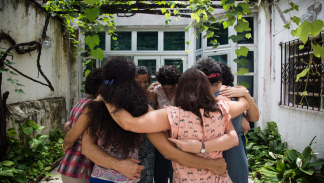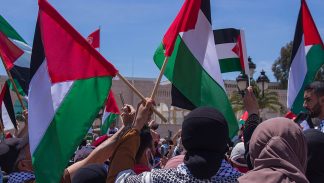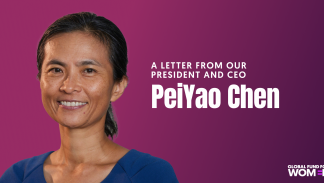Immaculee Birhaheka began working with women when she was 23 years old, and she has been focused on women’s groups and initiatives in the Democratic Republic of Congo ever since. Currently, Immaculee is the Executive Director of Global Fund for Women grantee partner Promotion et Appui aux Initiatives Féminines [Promotion and Support to Women’s Initiatives] (PAIF). We sat down with Immaculee at Global Fund for Women’s recent grantee meeting in Goma, DRC to discuss her work with PAIF and the current issues women and girls are facing.
PAIF has been working with women and girls in northeastern DRC since 1992 to educate women on their rights, empower women to participate in politics, provide resources to survivors of gender-based violence (including rape survivors), advance peace and security agendas for the area, and more. Social change is slowly progressing in North Kivu Province as a result of PAIF’s efforts: rape survivors face less stigma and discrimination, and have better access to legal, medical, and judicial support. Most recently, due to PAIF’s work, authorities in Kavumu arrested several perpetrators of gender-based violence who had fled, as well as some of the armed men who were committing sexual violence in the community. Learn more about PAIF’s work and read stories from the women they support »
Immaculee explains the work PAIF is doing to end violence against girls in schools in Goma, where gender-based violence and rape has become a disturbing trend, and to empower survivors of sexual violence with literacy training and income-generating skills:
“There is an alarming crisis in the Congo. Although it is illegal, beating is very common in the schools. These are beatings so severe that recently a girl in secondary school was beaten to death by her teacher. I’m running a Global Fund for Women-funded campaign against violence in schools.
What is most alarming is the young girls that are being raped. These girls are being coerced into having sex with their teachers by being told that they can’t stay in school or won’t pass their class if they don’t have sex with them. Or the teacher will violently have his way with the girl. Then when they do succumb to the teacher, he ignores the girl or kicks her out of class anyway so he doesn’t get caught.
Many of these girls are becoming pregnant by their own teachers. They are forced to leave school and having babies as result of these rapes, even though they are children themselves. Often their families will abandon them out of shame so they have no support, leaving them to be vulnerable to more abuse or rape.
One headmaster raped a young girl in 6th form and when they tried to convict him he ran away. There is little justice for these girls.
The land for shelter we have in Mugunga, is bought with money from the Global Fund for Women. They also supplied us with a grant for solar energy run batteries as we have no power or running water. Here at the shelter we teach women literacy, and some income generating skills such as sewing and hair braiding.
In north Kivu, I run safe houses – or shelters – for women and girls who have suffered gender based violence. There are women who are simply performing the daily activity of fetching water or collecting firewood in the forest when they are attacked and raped – often by the men who are meant to protect them, police or soldiers. They do not want to tell their husbands but sometimes they are so badly beaten and injured, they have to be hospitalized. Many times these women and girls become pregnant and produce children from the rape. Their husbands will abandon them for the fear of AIDS or the stigma of raising someone else’s baby. These women have no recourse, no justice.”
As told to photographer Alison Wright; edited for clarity. All photos copyright Alison Wright.
There are women who are simply performing the daily activity of fetching water or collecting firewood in the forest when they are attacked and raped – often by the men who are meant to protect them, police or soldiers.Immaculee Birhaheka


